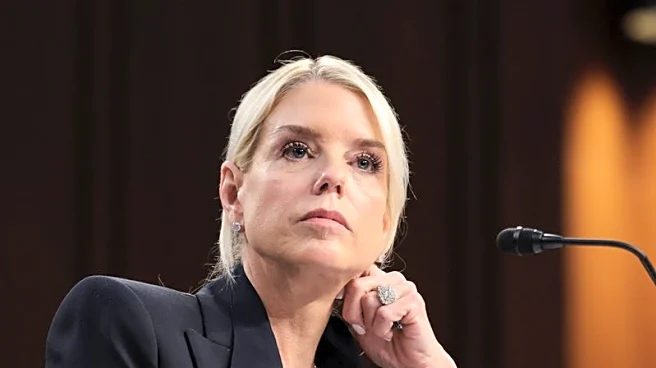What is the story about?
What's Happening?
Israeli Prime Minister Benjamin Netanyahu has indicated that efforts to secure a ceasefire in Gaza are now centered on a comprehensive deal to release all remaining hostages at once. This marks a shift from previous plans that involved a 60-day truce and partial release of hostages. Hamas leaders are currently in Cairo for preliminary talks with Egyptian officials, as mediators see a potential window to push a deal through. The situation follows a breakdown in indirect talks between Israel and Hamas last month, leading Israel to announce plans to expand its military offensive in Gaza. Intense Israeli strikes have continued, with significant casualties reported by the Hamas-run health ministry. Netanyahu has emphasized the need for the release of all hostages, both alive and deceased, as domestic pressure mounts over his plans to expand the war.
Why It's Important?
The focus on a comprehensive hostage release is significant as it could potentially lead to a cessation of hostilities in Gaza, impacting regional stability and humanitarian conditions. The ongoing conflict has resulted in substantial loss of life and has exacerbated humanitarian crises, with reports of widespread famine and malnutrition in Gaza. The resolution of the hostage situation could pave the way for broader negotiations involving the withdrawal of Israeli troops and the disarmament of Hamas. However, the demands for Hamas to relinquish control of Gaza and its weapons present substantial challenges. The international community, including human rights groups, has raised concerns about potential forced displacement of Palestinians, which would violate international law.
What's Next?
Negotiations are expected to continue, with Egypt, Qatar, and the US playing key roles as mediators. The proposed framework involves a ceasefire, the release of hostages and Palestinian prisoners, and the unimpeded flow of humanitarian aid into Gaza. However, achieving these goals in a short timeframe remains difficult due to Israel's demands. Netanyahu has reiterated that the war will only end when all hostages are returned and Hamas surrenders. The situation remains fluid, with potential for further escalation if a comprehensive agreement is not reached.
Beyond the Headlines
The conflict in Gaza has deep historical roots, with many Palestinians fearing a repeat of the 'Nakba' or catastrophe, when they were displaced during the creation of Israel in 1948. The humanitarian crisis in Gaza is severe, with the UN's World Food Programme warning of starvation and malnutrition at unprecedented levels. The international community's response to the situation could influence future geopolitical dynamics in the region, particularly regarding the recognition of Palestinian statehood and the rights of refugees.
















